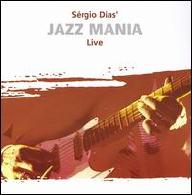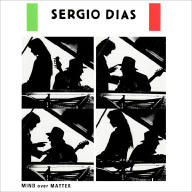The son of Clarisse Leite Dias Baptista, a concerto pianist and the first woman in the world to write a concert for piano and orchestra, Dias took up the guitar very early and decided to abandon formal studies at 13 to dedicate himself solely to music. Later, together with his brothers Arnaldo Dias Baptista and Cláudio César Dias Baptista and some friends, he took the path of rock roll.
Dias began to play bass in the group the Wooden Faces, a name which was changed several times from O'seis to O Konjunto and at last, in 1966, it went through its last mutation to Os Mutantes (the mutants), under such name becoming the most important rock band in Brazil. The initial formation was a trio with Arnaldo Baptista (bass/voice), Rita Lee (voice/percussion/visual conception), and Dias (who was 15) on the guitar and vocals. His brother, Cláudio César, took charge of the sound engineering as he was a real electronic mastermind. He devised and invented innovative sound effects based on the sound he listened to on records, without ever having seen these new gadgets; he also designed the band's own sound systems. Os Mutantes played a fundamental role in the Tropicalia movement, helping shape it through their live performances at historic festivals, making some of those appearances backing Gilberto Gil, and also participating in the recording of several Tropicalia artists such as Gil and Caetano Veloso.
After Os Mutantes broke up, Dias was invited by Yes producer Eddie Offord to record Dias's first international album in 1980. In that time, he moved to New York, where in the following ten years, he would play with such names as Indian violinist Leon Shankar, John McLaughlin, Jeremy Steig, TM Steves, Gil Evans, and others. Teaming with Airto Moreira and Flora Purim in the band Steps of the Imagination, he toured for three years through the U.S., returning to New York for the recording of the album East Side Strut (co-produced by Eumir Deodato). In 1990, he produced and recorded with English guitarist Phil Manzanera for his second international solo album Mato Grosso (Black Sun Records). The next year marked the release of the third, Mind Over Matter, which had international distribution through Expression Records. The album was released in Brazil by Natasha Records, with the bonus track Cidadão da Terra, a remake of the original song from the Os Mutantes album Tudo Foi Feito Pelo Sol (1974). In 1993, Dias was awarded by the Carioca newspaper O Globo as the best Brazilian guitarist. In October 1994, he toured South Africa and was presented at a Christmas special on South African TV. In that time, he began the recording of Song of the Leopard (Celestial Harmonies), which was finished in his home studio in Brazil (he played almost all instruments and produced and mixed it) and was released in 1997 in 30 countries. In 1996, he wrote the song White Cloud for the German album Global Brazilians (Metalimbo Records). In 1997, he recorded a live jazz album at the Carioca nightclub Jazzmania. Mind Over Matter followed three years later. ~ Alvaro Neder, Rovi














